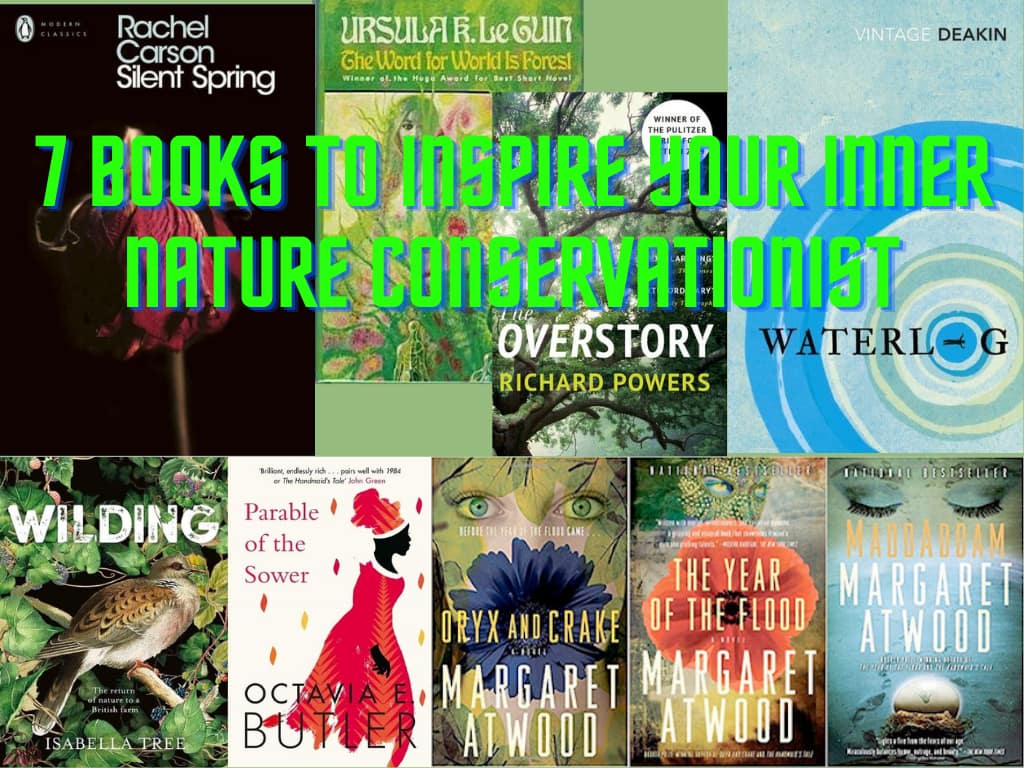1. Wilding by Isabella Tree
It isn’t often a book about the damage farming does to the ecosystem becomes a best seller, but somehow Isabella’s calm, impassioned writing brings the facts and figures to life.
Based on a small family farm in the clay soil-ridden East Sussex, the Burrell family struggled along for years, using farming practices encouraged by subsidies. After a particularly disastrous year, they shut up shop and began a far riskier project – rewilding their 1,400-hectare farm.
The book isn’t just about their story, it also focuses on the rewilding movement in general, using their farm as an example of what is possible. It is an inspiring and inspired book, which will make you see ‘waste’ ground in a whole new light.
2. Silent Spring by Rachel Carson
Written in the 1960s, but no less influential today, Rachel Carson’s ‘Silent Spring’ is arguable one of the most important scientific books since ‘The Origin of Species’ by Charles Darwin (according to David Attenborough at least!)
It sparked a revolution in the way pesticides are talked about through its accessible interrogation of scientific data. Carson showed that not only were pesticides destroying insect populations, but that chemical companies knew about it and considered it a necessary side effect of progress.
Rachel Carson was responsible for putting a fire in the belly of many influential environmentalists. Her book has also been credited with changing the way we think about the natural world, changing it from a rogue element to be controlled, to a crucial and undervalued asset.
3. Waterlog by Rodger Deakin
Many argue that Rodger Deakin did for wild swimming what The Ramblers did for walking. Now we don’t know about that, but we can say for certain that Deakin’s book made us see the English Countryside from an entirely different perspective.
The book follows Deakin as he sets out across the UK, swimming in frogspawn filled ponds and fast-flowing rivers, Lakeland tarns and the frigid North Sea. He has an infectious love of nature, which comes through in his encyclopaedic knowledge of plant and animal life.
It isn’t an obviously conservation-focused book, but as anyone who’s interested in the natural world will tell you, you can’t really talk about what is there now without talking about what is no longer here too.
4. The Overstory by Richard Powers
If you prefer your books fictional instead, you could do much worse than choosing Overstory by Richard Powers. The main thread of his book isn’t the multiple narrators who tell it, but rather their shared relationship to the outside world.
Each story contains a tree, or trees, which change the course of the characters’ lives. They are drawn together and cleft apart by our arboreal overlords. They fight for them, they die for them, and they are forever changed by them.
It all sounds a little lofty when described like that, but at its heart, this is a story about humans and their environment, how we are all intertwined not just with each other, but with all the living creatures we share the world with.
5. The Word for World is Forest by Ursula K. Le Guin
K. Le Guin is well known for her thought-provoking Science Fiction, often using the genre to talk about the big issues. This novella is no different, in less than 200 pages she creates a vivid world, wracked by the same problems we face in our own lives.
Set on a distant woodland planet, many years after the last tree on earth was felled, this book chronicles the conflict between the violent, colonising Yumens and the peaceful native Athsheans.
This book isn’t just about the effects of humans on their environment, but also about the effects of environmental degradation on the human soul. It’s powerful and moving and will make you appreciate that tree in your garden all the more.
6. The Parable of the Sower by Octavia E. Butler
Set in the not very distance 2024, this searing work of speculative fiction probably won’t leave you feeling optimistic about the future.
The story is told in the form of a diary, written by teenage empath Lauren Oya Olamina. She lives in the relatively affluent gated community of Robledo, just outside Los Angeles. The world around her has fallen into chaos through political turmoil and the effects of climate change. All around her people are suffering and dying. In amongst this horror and manmade deprivation, a germ of an idea is building in Lauren’s mind, a religion that could save the humans from themselves.
This book is a wake-up call, in paperback form, but perhaps don’t read it if you want to feel less gloomy about the state of the world.
7. The Maddadam Series by Margaret Atwood
This series (similarly to the above suggestion) will not make you feel less gloomy. It is, after all, set in the not-too-distant future after a viral plague kills most of the humans on the ever-warming earth. Perhaps a touch on the nose at the moment.
BUT, and it is a big but, this series is far more than a dystopia, it’s also about how stories are told and reproduced, how human progress works and how our endless obsession with science blinds us to the important things in life.
It’s a thought-provoking but surprisingly compulsive read. Give it a go if you’re feeling brave enough!
Don’t forget to let us know on social media what your favourite book about the environment is, follow us on all the major channels below!

